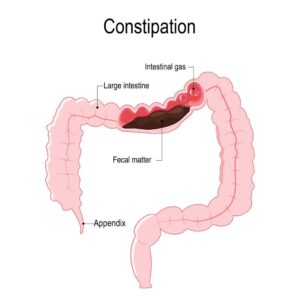
Constipation is something almost everyone experiences at some point. But when it becomes chronic, meaning it lasts for weeks or months, it can disrupt daily life, cause discomfort, and lead to other health problems. If you find yourself struggling with fewer than three bowel movements per week, hard stools, or feeling like you can’t empty your bowels completely, you might be dealing with chronic constipation.
In this guide, we’ll talk about when to see a specialist, what you can expect during your visit, and how to find relief.
What Causes Chronic Constipation?
Chronic constipation happens for many reasons. Some common causes include:
- Poor Diet: Not eating enough fiber-rich foods like fruits, vegetables, and whole grains can slow digestion.
- Dehydration: Not drinking enough water makes stool harder and more difficult to pass.
- Lack of Physical Activity: Sitting for long hours and not moving enough can lead to slower digestion.
- Ignoring the Urge: Regularly ignoring the urge to have a bowel movement can worsen constipation over time.
- Certain Medications: Painkillers, iron supplements, and some antidepressants can contribute to constipation.
- Medical Conditions: Conditions like thyroid problems, diabetes, or neurological disorders can also cause chronic constipation.
When to See a Specialist
Occasional constipation is normal and often improves with diet and lifestyle changes. But you should consider seeing a specialist if:
- You’ve had constipation for more than three weeks.
- Home remedies and over-the-counter medicines don’t help.
- You’re experiencing severe abdominal pain, swelling, or bloating.
- You have blood in your stool.
- You’re losing weight unexpectedly.
- You feel a blockage that prevents passing stool.
Seeing a doctor or a gastroenterologist is important because chronic constipation can be a sign of an underlying condition that needs medical care.
What to Expect at Your Appointment
If you decide to see a specialist, here’s what might happen:
1. Medical History and Discussion
Your doctor will ask about:
- Your bowel movement habits.
- Your diet and fluid intake.
- Any medications you’re taking.
- When your symptoms started and how often they occur.
Being honest and detailed helps your doctor understand your condition better.
2. Physical Exam
A gentle physical exam, including checking your abdomen and possibly a rectal exam, helps the doctor assess any blockages or structural issues.
3. Diagnostic Tests
Depending on your symptoms, your doctor may order:
- Blood Tests: To check for thyroid issues or other metabolic problems.
- X-ray or CT Scan: To see if there’s a blockage in your colon.
- Colonoscopy: A thin, flexible tube with a camera is inserted into the colon to look for abnormalities like polyps or tumors.
- Transit Studies: These tests track how quickly food moves through your digestive system.
These tests help rule out serious conditions like colon cancer or nerve/muscle problems in the digestive tract.
Treatment Options for Chronic Constipation
The good news is that chronic constipation is treatable. Your doctor might suggest one or more of the following:
1. Dietary Changes
Adding more fiber to your diet is often the first step. Foods like whole grains, beans, apples, pears, and leafy greens help soften stool and make it easier to pass.
2. Drinking More Fluids
Water helps keep stool soft. Aim for at least 8 glasses of water a day unless your doctor says otherwise.
3. Exercise
Physical activity helps your digestive system work better. Even a 30-minute walk each day can make a big difference.
4. Medications
If diet and exercise don’t help, your doctor may recommend:
- Fiber Supplements: Help bulk up stool.
- Stool Softeners: Make passing stool less painful.
- Laxatives: Only to be used under medical guidance, especially for long-term use.
5. Advanced Treatments
In rare cases, procedures or surgery may be needed if chronic constipation is caused by structural issues or nerve/muscle problems in the colon.
Tips for Preventing Constipation
- Eat a high-fiber diet every day.
- Drink plenty of water.
- Don’t ignore the urge to go to the bathroom.
- Stay active and move your body regularly.
- Limit processed and junk foods.
- Manage stress, as it can affect your digestion.
Finding the Right Specialist
If you’re tired of dealing with constipation and ready for relief, it’s important to find a doctor you trust. Working with one of the top 10 gastroenterologist in Surat ensures you’re getting care from experienced professionals who can provide a personalized treatment plan. They’ll help you find solutions that work best for your body and your lifestyle.
Final Thoughts
Chronic constipation is more than just an inconvenience—it can seriously affect your health and well-being. While it’s tempting to ignore the problem or keep hoping it will improve on its own, seeing a specialist can make a world of difference. With the right care, diet changes, and support, you can get back to living comfortably and feeling your best.
Don’t wait any longer—take steps today to say goodbye to chronic constipation and hello to better digestive health!
